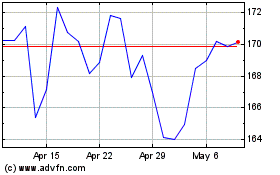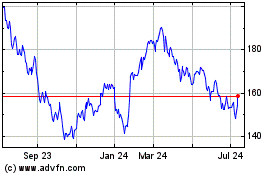By Ben Dummett in London, Suzanne Kapner in New York and Matthew Dalton in Paris
The European luxury conglomerate behind Louis Vuitton and
Bulgari is taking over Tiffany & Co. in a more than $16 billion
gamble that it can restore shine to the famed jeweler.
LVMH Moët Hennessy Louis Vuitton and Tiffany have reached a
preliminary agreement on a deal that values the U.S. company at
$135 a share, according to people familiar with the matter. The
boards of the two companies were meeting Sunday to complete a deal,
they said.
A deal would give LVMH a classic American brand that has
struggled with weak demand at home and abroad. It is also a bet on
the Chinese economy and consumers, whose fast-rising incomes have
made them the luxury industry's most important customers. In search
of growth, Tiffany is building flagship stores in several Chinese
cities.
The acquisition would be the biggest yet by LVMH under Bernard
Arnault, the French billionaire who has been the luxury group's
chief executive and controlling shareholder for three decades. It
tops the $13 billion Mr. Arnault paid in 2017 to bring all of the
French fashion house Dior under the ownership of LVMH.
LVMH, which owns 75 brands, has become one of Europe's most
valuable companies worth $220 billion by creating a mass market for
luxury goods. Louis Vuitton, which by some estimates accounts for
one-quarter of the Paris-based company's revenue, sells leather
goods starting at a few hundred dollars in more than 450 stores
world-wide.
Tiffany, too, sells silver bracelets for a few hundred dollars
as well as diamond engagement rings for tens of thousands of
dollars. It has more than 300 stores globally and about $4.5
billion in annual revenue. It gets nearly $2 billion of its sales
in Asia and its flagship Fifth Avenue store is popular with Chinese
tourists.
The 182-year-old brand has been trying to rebuild its business
after ousting its chief executive two years ago amid pressure from
an activist investor. Under CEO Alessandro Bogliolo, Tiffany has
pushed an expansion into China, and branched into gemstones and
gold jewelry, hoping to attract a younger and more international
clientele.
The discussions began last month after LVMH executive Antonio
Belloni reached out to Mr. Bogliolo, a former LVMH executive,
people familiar with the matter said. Mr. Belloni made his
company's intentions known to Mr. Bogliolo at a lunch on Oct. 15 in
New York, catching him by surprise, these people said.
Tiffany executives were open to a deal, figuring that they could
execute their turnaround strategy better as a private company with
LVMH's support, one of the people said. However, they felt that
LVMH initially lowballed with a $120 per share offer. In recent
weeks, discussions between the two sides centered on establishing a
fairer price for the historical value of the Tiffany brand and its
reputation, according to the people familiar with the matter.
Shares of New York-based Tiffany have surged on hopes of a deal
at a higher price, closing Friday at $125.51. The shares peaked
near $140 in the middle of last year. The Financial Times earlier
reported that a deal was close.
Buying Tiffany would increase LVMH's exposure to jewelry, one of
the fastest-growing businesses in the luxury sector. Along with
Tiffany rival Bulgari, LVMH also owns luxury watchmakers Hublot and
TAG Heuer.
The conglomerate has for years sought to boost its presence in
jewelry, which is one of LVMH's smallest divisions. Tiffany is one
of the few brands that has the size to move the needle for LVMH.
Its executives like the jewelry business because it has steep
barriers to entry, insulating big manufacturers from upstart
competitors, people familiar with the matter said.
In 2018, luxury jewelry sales rose 7% to about $20 billion,
according to Bain & Co. The overall market for personal luxury
goods was worth nearly $290 billion last year, according to
Bain.
LVMH executives view Tiffany as a "sleeping beauty," a brand
with great promise, but one that sat out the recent uptick in the
jewelry market, according to people familiar with the
situation.
They plan to increase marketing at Tiffany and provide more cash
to accelerate its existing strategy, which includes launching more
new products, upgrading boutiques and making the brand more
appealing to millennials, the people said.
Although many of the products Tiffany sells aren't as high-end
as those sold by Bulgari or other European luxury jewelers, LVMH
views its wide range of prices as a good way to attract younger
shoppers, the people said.
As part of LVMH, Tiffany would be relieved of the need to report
back to shareholders every quarter, giving executives time to
implement a turnaround. LVMH doesn't disclose the performance of
individual brands.
The conglomerate, which has about $50 billion in annual revenue,
would use the large profits generated from its powerhouse brands --
principally Louis Vuitton -- to fund the big investments that will
likely be needed to reinvigorate Tiffany.
Write to Ben Dummett at ben.dummett@wsj.com, Suzanne Kapner at
Suzanne.Kapner@wsj.com and Matthew Dalton at
Matthew.Dalton@wsj.com
(END) Dow Jones Newswires
November 24, 2019 17:25 ET (22:25 GMT)
Copyright (c) 2019 Dow Jones & Company, Inc.
LVMH Moet Hennessy Louis... (PK) (USOTC:LVMUY)
Historical Stock Chart
From Mar 2024 to Apr 2024

LVMH Moet Hennessy Louis... (PK) (USOTC:LVMUY)
Historical Stock Chart
From Apr 2023 to Apr 2024
